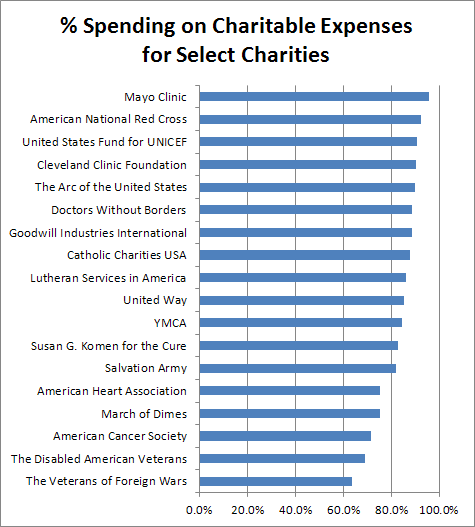Debunking an E-mail on Charities
 Given the time of year and knowing that many people will be donating to charities around this time, I figured this was a good time to address this. A friend of mine got an e-mail supposedly listing charities that don't do a good job of spending donations, and other charities that make your dollars go farther. He knew I'd want to see it, so he forwarded it to me. He was right - the e-mail was one that I couldn't pass up.
Given the time of year and knowing that many people will be donating to charities around this time, I figured this was a good time to address this. A friend of mine got an e-mail supposedly listing charities that don't do a good job of spending donations, and other charities that make your dollars go farther. He knew I'd want to see it, so he forwarded it to me. He was right - the e-mail was one that I couldn't pass up.
This e-mail was actually already covered pretty well by Snopes:
Charitable Compensation
And of course, the Mickelson's covered the e-mail pretty well, but I still wanted to add a bit more.
Needless to say, most of the information in the e-mail was wrong or misleading. But what if it wasn't? Several of the supposed facts in this e-mail are about CEO salaries, not overall spending of these organizations. And while a part of us wants everybody involved in a charity to be charitable themselves, the real question is, what's best for the charity? Look at it this way. The Red Cross is a big organization with a big budget. They need someone at the top who knows what they're doing. Now maybe, they could get someone charitable enough to be CEO for a low salary, but what would be the qualifications of that person? Or, they could decide to spend some money and hire the best CEO they can get - maybe not a particularly charitable person, but well qualified. Which would be better for the organization, and which would help them be more efficient overall?
In my mind, the measure of efficiency of a charity should not be how much the top person gets paid, but how much of their money is going into actual charity, not overhead. Luckily, a few organizations have already done the hard work of researching the finances of several charities to come up with this information. The chart below summarizes a few charities - the top 10 by revenue, the other charities listed in the e-mail, and a few that I included just out of personal interest. All of the data for the table below came from Forbes magazine's The 200 Largest U.S. Charities. Clicking on any of the charity names will take you to the Forbes entry for that organization.
| Organization | Total Revenue, millions | Total Expenses, millions | Program / Charitable Expenses, millions | % Spending on Charitable Expenses |
| Top 10 Charities by Revenue |
||||
| Lutheran Services in America | $18,310 | $17,520 | $15,050 | 85.9% |
| Mayo Clinic | $7,970 | $7,430 | $7,110 | 95.7% |
| YMCA | $5,920 | $5,670 | $4,790 | 84.5% |
| Catholic Charities USA | $4,670 | $4,220 | $3,710 | 87.9% |
| United Way | $4,230 | $4,230 | $3,600 | 85.1% |
| Goodwill Industries International | $4,040 | $3,820 | $3,380 | 88.5% |
| Salvation Army | $3,750 | $3,240 | $2,660 | 82.1% |
| The Arc of the United States | $3,730 | $3,610 | $3,240 | 89.8% |
| Cleveland Clinic Foundation | $3,730 | $3,450 | $3,110 | 90.1% |
| American National Red Cross | $3,710 | $3,350 | $3,090 | 92.2% |
| Other Charities from E-mail |
||||
| March of Dimes | $218 | $206 | $155 | 75.2% |
| United States Fund for UNICEF | $456 | $447 | $405 | 90.6% |
| The Veterans of Foreign Wars | $87 | $85 | $54 | 63.5% |
| The Disabled American Veterans | $125 | $126 | $87 | 69.0% |
| Select Other Charities |
||||
| American Cancer Society | $956 | $951 | $681 | 71.6% |
| American Heart Association | $600 | $580 | $437 | 75.3% |
| Doctors Without Borders | $275 | $204 | $181 | 88.7% |
| Susan G. Komen for the Cure | $353 | $337 | $279 | 82.8% |
| Data Not Readily Available |
||||
| The American Legion | -- | -- | -- | -- |
| The Military Order of Purple Hearts | -- | -- | -- | -- |
| The Vietnam Veterans Association | -- | -- | -- | -- |
Here's another way of looking at the data. I took the last column from the table above, % Spending on Charitable Expenses, and plotted it for the included charities, sorted from highest percentage to lowest.

I'll add that there are other considerations. For example, in a previous entry of mine, The Salvation Army - To Give, or Not to Give?, I discussed how the Salvation Army spends its money. As it turns out, they spend money on causes that I don't agree with, so I've decided to donate to other organizations that perform similar functions.
What to do with all this information is up to you. It depends on how much overhead you think is an acceptable amount, and whether or not there are any other organizations dedicated to performing the same mission as those charities.
More Info (including links already given):
- Charity Navigator - Your Guide to Intelligent Giving
- Forbes - The 200 Largest U.S. Charities
- American Institute of Philanthropy - Charity Watch
- LoveToKnow - What Percentage of Donations Go to Charity
- The Salvation Army - To Give, or Not to Give?
- Council for Secular Humanism - Research Report: How Secular Humanists (and Everyone Else) Subsidize Religion in the United States
- Snopes - Charitable Compensation
For anyone interested, the e-mail that prompted this entry is available below the fold.
Image Source: ATR International
Think about these before you donate. As you open your pockets to do a good thing and make yourself feel good, please keep these facts in mind:The American Red Cross
President and CEO Marsha J. Evans salary for the year was $651,957 plus expensesMARCH OF DIMES
It is called the March of Dimes because only a dime for every 1 dollar is given to the needy.The United Way
President Brian Gallagher receives a $375,000 base salary along with numerous expense benefits.UNICEF
CEO Caryl M. Stern receives $1,200,000 per year (100k per month) plus all expenses including a ROLLS ROYCE. Less than 5 cents of your donated dollar goes to the cause.
GOODWILL
CEO and owner Mark Curran profits $2.3 million a year.
Goodwill is a very catchy name for his business. You donate to his business and then he sells the items for PROFIT. He pays nothing for his products and pays his workers minimum wage! Nice Guy.
$0.00 goes to help anyone!!! Stop giving to this man.
Instead give it to SALVATION ARMY.The Salvation Army
Commissioner Todd Bassett receives a small salary of only $13,000 per year (plus housing) for managing this $2 billion dollar organization. 96 percent of donated dollars go to the cause.The American Legion
National Commander receives a $0.00 zero salary. Your donations go to help Veterans and their families and youth!The Veterans of Foreign Wars
National Commander receives a $0.00 zero salary. Your donations go to help Veterans and their families and youth!The Disabled American Veterans
National Commander receives a $0.00 zero salary. Your donations go to help Veterans and their families and youth!The Military Order of Purple Hearts
National Commander receives a $0.00 zero salary. Your donations go to help Veterans and their families and youth!The Vietnam Veterans Association
National Commander receives a $0.00 zero salary. Your donations go to help Veterans and their families and youth!Please share this with everyone you can.
Thank you.

 Chapters 21 through 30 aren't particularly exciting. They cover mostly rules for the Israelites, and instructions on a sanctuary and its accessories for worshiping God.
Chapters 21 through 30 aren't particularly exciting. They cover mostly rules for the Israelites, and instructions on a sanctuary and its accessories for worshiping God. Over the weekend, I watched the movie, Life of Pi. I liked it, though it was very sad. I really hadn't known much about the story beforehand, so I didn't realize that there would be so much discussion of religion. Honestly, I didn't think there was anything truly profound about the religious discussions - I thought it was just a part of the story. Perhaps the book was different, or perhaps I missed it, but apparently, the religious aspect was a big part of the story. One critic,
Over the weekend, I watched the movie, Life of Pi. I liked it, though it was very sad. I really hadn't known much about the story beforehand, so I didn't realize that there would be so much discussion of religion. Honestly, I didn't think there was anything truly profound about the religious discussions - I thought it was just a part of the story. Perhaps the book was different, or perhaps I missed it, but apparently, the religious aspect was a big part of the story. One critic,  The Christmas season is upon us, which means it's time for us Scrooges to ramp up the war. To tell the truth, after skimming through some of my older entries, I don't have anything new to add. The 'War on Christmas' is a bit silly, considering how Christmas has been treated in this country in the past. The Puritans even outlawed it's celebration (see the first link below). Personally, I'm going to decorate the house, put up a tree, give presents, and just about every other tradition associated with this time of year other than go to church.
The Christmas season is upon us, which means it's time for us Scrooges to ramp up the war. To tell the truth, after skimming through some of my older entries, I don't have anything new to add. The 'War on Christmas' is a bit silly, considering how Christmas has been treated in this country in the past. The Puritans even outlawed it's celebration (see the first link below). Personally, I'm going to decorate the house, put up a tree, give presents, and just about every other tradition associated with this time of year other than go to church. If you've followed this blog at all, you might have noticed that I began a tradition of posting a YouTube video of Tim Minchin's song, White Wine in the Sun, every year around Christmas (I'll be posting it shortly this year). As described on Minchin's
If you've followed this blog at all, you might have noticed that I began a tradition of posting a YouTube video of Tim Minchin's song, White Wine in the Sun, every year around Christmas (I'll be posting it shortly this year). As described on Minchin's  November's over, so it's time to look at the server logs again and see what pages on this site were most popular. There were no huge surprises. The top four spots remained unchaged from last month. I wonder how long the
November's over, so it's time to look at the server logs again and see what pages on this site were most popular. There were no huge surprises. The top four spots remained unchaged from last month. I wonder how long the